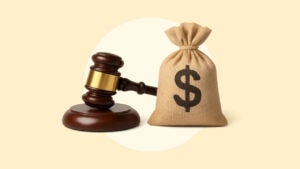How to calculate discretionary income for your repayment plan

Key takeaways
- You can calculate discretionary income using a simple formula, and that allows you to prepare for payment changes as situations and finances change.
- Discretionary income is the amount of income you have leftover after paying for necessities.
- Your discretionary income is used to calculate your payments on an IDR plan.
Income-driven repayment (IDR) plans typically base your monthly student loan payment on your discretionary income – the difference between your annual income and a percentage of the poverty guideline for your family size and state of residence. Understanding this figure is crucial since it directly influences what you pay under IDR plans.
Starting in July 2026, the new Repayment Assistance Plan (RAP) will replace much of the current system and base payments on adjusted gross income (AGI) instead. Unlike current IDR plans, RAP will require every borrower to pay at least $10 per month, even those who previously qualified for a $0 payment.
How to calculate your discretionary income
- What is discretionary income?
-
The difference between your annual income and a percentage of the poverty guideline for your family size and state of residence.
Learning how to calculate your discretionary income will help you determine what your student loan payment will be on any of the IDR plans. Here’s how to do it:
- Look up the federal poverty guidelines for your state and family size.
- Multiply the federal poverty amount by 150 percent, or 100 percent if you’re pursuing the income-contingent repayment plan (ICR).
- 225 percent for the SAVE plan
- 150 percent for IBR or PAYE plans
- 100 percent for the ICR plan
- Subtract that amount from your income. The result is your discretionary income.
- Apply the plan’s percentage. Each IDR plan caps your payment at a share of discretionary income:
| Plan | Percentage of discretionary income | Estimated monthly payment |
|---|---|---|
| Pay As You Earn (PAYE) | 10 percent | (Discretionary income x 10%) ÷ 12 |
| Income-Based Repayment (IBR) | 10 percent or 15 percent depending on what you borrowed |
(Discretionary income x percentage) ÷ 12 |
| Income-Contingent Repayment (ICR) | 20 percent or based on 12-year standard formula | (Discretionary income x 20%) ÷ 12 |
If you’re married, your spouse’s income may also need to be considered, but this depends on your chosen repayment plan. For most IDR plans, your spouse’s income will only be included if you file taxes jointly. The Revised Pay As You Earn (REPAYE) Plan, on the other hand, will include your spouse’s income in the calculation regardless of filing status.
You can also use the U.S. Department of Education’s loan simulator to see your monthly payments under all the plans you qualify for. From there, you can weigh the pros and cons and decide whether to change your repayment plan or stick with the standard plan.
Example of an IDR plan
Suppose you live in New York and earn $70,000. Under SAVE (one type of IDR), here’s how you would calculate your discretionary income:
- Find the 2025 federal poverty guideline for New York, which is $15,650.
- Multiply that by 225 percent (the SAVE threshold): $15,650 x 2.25 = $35,212.50
- Subtract that amount from your income: $70,000 – $35,212.50 = $34,787.50 = discretionary income
- Apply the SAVE percentage:
- For undergraduate loans, 5 percent of $34,787.50 = $1,739 per year or $145 per month
- For graduate loans, 10 percent of $3,479 per year or $290 per month

SAVE Plan ending: Federal loan borrowers in 11 states will see $300-plus monthly interest charges
Are you on the SAVE Plan and wondering what your next steps should be? Principal writer Andrew Pentis breaks it down for you.
Learn moreHow discretionary income can change
Discretionary income is not a one-time calculation. Under an IDR plan, you have to resubmit your income, family size and state of residence information every year. Several scenarios can cause your discretionary income, as well as your monthly payment on an IDR plan, to change:
- The poverty guideline changed: Federal poverty guidelines are updated every year, so it’s very likely that your monthly payment will change from one year to the next.
- Your salary changed: If you received a salary increase, your payments will likely reflect this increase. On the other hand, if your income decreases, you’ll likely see a decreased monthly payment.
- Your family grew or your marital status changed: Federal poverty guidelines increase with family size. For example, the 2025 federal poverty guidelines for a single person in most states are $15,650, but they are $21,150 for a family of two.
- You moved states: The contiguous states have different poverty guidelines than Alaska and Hawaii, so if you move to or from those states, expect a payment change.
How calculations will look under RAP
Starting July 1, 2026, RAP will replace most existing IDR plans. Here’s how it works differently:
- Payments are based on AGI, not discretionary income.
- There’s a $10 monthly minimum, no matter where you fall on the poverty line.
- Payments range from 1 to 10 percent of AGI, depending on income level.
- You receive a $50 monthly deduction per dependent.
- Forgiveness comes after 30 years of payments.
- Some balance may be reduced monthly if your payment doesn’t cover $50 of principal.
Estimated RAP payments by AGI
| AGI | Monthly payment or percentage of income |
|---|---|
| Less than $10,000 | $10 minimum |
| $10,001 – $20,000 | 1% of AGI |
| $20,001 – $30,000 | 2% of AGI |
| $30,001 – $40,000 | 3% of AGI |
| $100,000 and above | 10% of AGI |
| Yearly income | RAP monthly payment |
|---|---|
| $20,000 | $20,000 × 1% ÷ 12 = ~$17 per month |
| $40,000 | $40,000 × 2% ÷ 12 = ~$67 per month |
| $60,000 | 4% → ~$200 per month |
| $90,000 | 7% → ~$525 per month |
| $200,000 | 10% → ~$1,667 per month |
Bottom line
Understanding discretionary income is essential if you’re managing your student loans now, but with RAP on the horizon, borrowers should be aware of the following:
- Payments may increase, especially at lower income levels, due to the $10 minimum and use of AGI.
- Forgiveness takes longer – 30 years instead of up to 25 under IDR.
- Dependent deductions and interest/principal subsidies under RAP offer some relief, but may not offset increased costs for many borrowers.
- Compare your current plan (like SAVE, PAYE or IBR) against RAP to determine what works best for your future – especially if you’re close to forgiveness or in a low-income bracket.
Why we ask for feedback Your feedback helps us improve our content and services. It takes less than a minute to complete.
Your responses are anonymous and will only be used for improving our website.
You may also like

Qualifying for a student loan tax offset hardship refund

How to determine whether you have federal student loans





